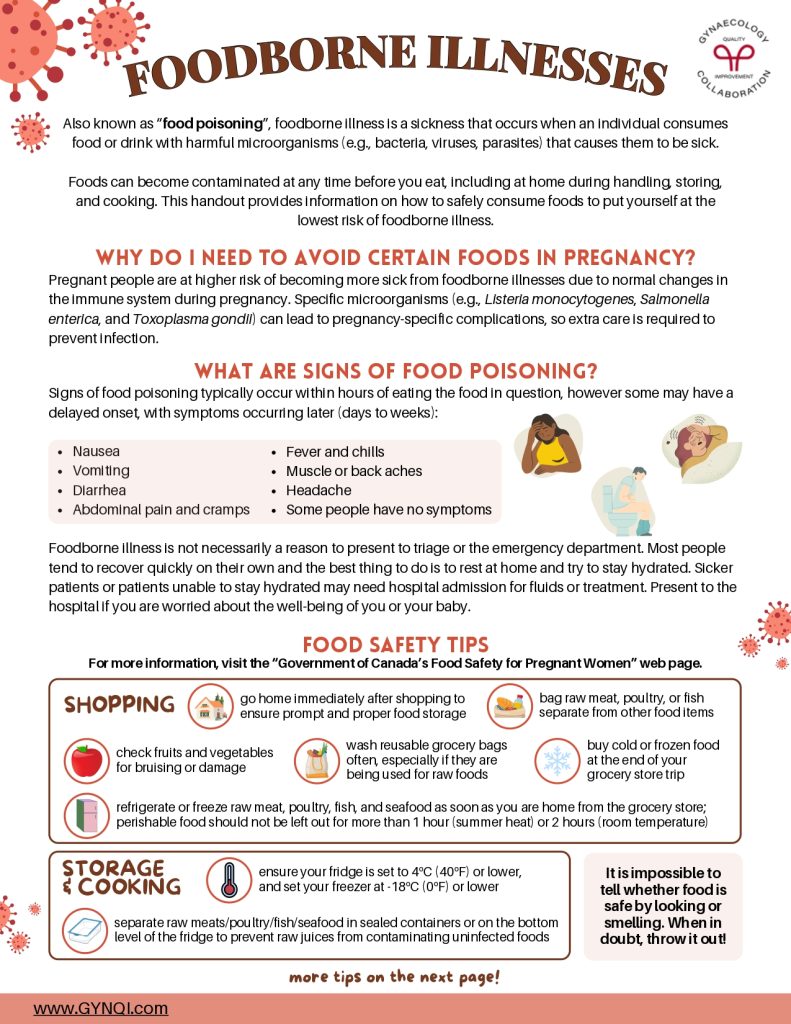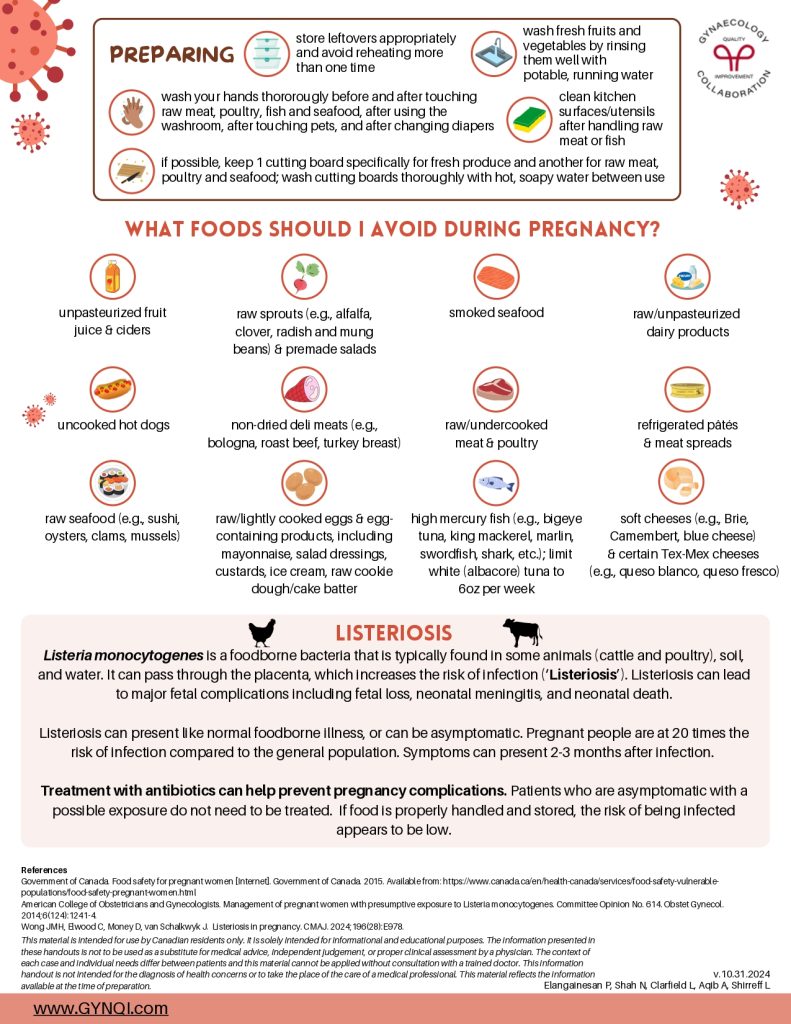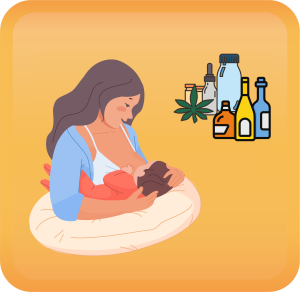
Foodborne Illnesses
Also known as “food poisoning”, foodborne illness is a sickness that occurs when an individual consumes food or drink with harmful microorganisms (e.g., bacteria, viruses, parasites) that causes them to be sick.
Foods can become contaminated at any time before you eat, including at home during handling, storing, and cooking. This handout provides information on how to safely consume foods to put yourself at the lowest risk of foodborne illness.
Why Do I Need to Avoid Certain Foods in Pregnancy?
Pregnant people are at higher risk of becoming more sick from foodborne illnesses due to normal changes in the immune system during pregnancy. Specific microorganisms (e.g., Listeria monocytogenes, Salmonella enterica, and Toxoplasma gondii) can lead to pregnancy-specific complications, so extra care is required to prevent infection.
What Are Signs of Food Poisoning?
Signs of food poisoning typically occur within hours of eating the food in question, however some may have a delayed onset, with symptoms occurring later (days to weeks):
- Nausea
- Vomiting
- Diarrhea
- Abdominal pain and cramps
- Fever and chills
- Muscle or back aches
- Headache
- Some people have no symptoms
Foodborne illness is not necessarily a reason to present to triage or the emergency department. Most people tend to recover quickly on their own and the best thing to do is to rest at home and try to stay hydrated. Sicker patients or patients unable to stay hydrated may need hospital admission for fluids or treatment. Present to the hospital if you are worried about the well-being of you or your baby.
Food Safety Tips
For more information, visit the “Government of Canada’s Food Safety for Pregnant Women” web page.
Shopping
- go home immediately after shopping to ensure prompt and proper food storage
- bag raw meat, poultry, or fish separate from other food items
- check fruits and vegetables for bruising or damage
- wash reusable grocery bags often, especially if they are being used for raw foods
- buy cold or frozen food at the end of your grocery store trip
- refrigerate or freeze raw meat, poultry, fish, and seafood as soon as you are home from the grocery store; perishable food should not be left out for more than 1 hour (summer heat) or 2 hours (room temperature)
Storage & Cooking
- ensure your fridge is set to 4ºC (40ºF) or lower, and set your freezer at -18ºC (0ºF) or lower
- separate raw meats/poultry/fish/seafood in sealed containers or on the bottom level of the fridge to prevent raw juices from contaminating uninfected foods
It is impossible to tell whether food is safe by looking or smelling. When in doubt, throw it out!
Preparing
- store leftovers appropriately and avoid reheating more than one time
- wash fresh fruits and vegetables by rinsing them well with potable, running water
- wash your hands thoroughly before and after touching raw meat, poultry, fish and seafood, after using the washroom, after touching pets, and after changing diapers
- clean kitchen surfaces/utensils after handling raw meat or fish
- if possible, keep 1 cutting board specifically for fresh produce and another for raw meat, poultry and seafood; wash cutting boards thoroughly with hot, soapy water between use
What Foods Should I Avoid During Pregnancy?
- unpasteurized fruit juice & ciders
- raw sprouts (e.g., alfalfa, clover, radish and mung beans) & premade salads
- smoked seafood
- raw/unpasteurized dairy products
- uncooked hot dogs
- non-dried deli meats (e.g., bologna, roast beef, turkey breast)
- raw/undercooked meat & poultry
- refrigerated pâtés & meat spreads
- raw seafood (e.g., sushi, oysters, clams, mussels)
- raw/lightly cooked eggs & egg-containing products, including mayonnaise, salad dressings, custards, ice cream, raw cookie dough/cake batter
- high mercury fish (e.g., bigeye tuna, king mackerel, marlin, swordfish, shark, etc.); limit white (albacore) tuna to 60z per week
- soft cheeses (e.g., Brie, Camembert, blue cheese) & certain Tex-Mex cheeses (e.g., queso blanco, queso fresco)
Listeriosis
Listeria monocytogenes is a foodborne bacteria that is typically found in some animals (cattle and poultry), soil, and water. It can pass through the placenta, which increases the risk of infection (‘Listeriosis’). Listeriosis can lead to major fetal complications including fetal loss, neonatal meningitis, and neonatal death.
Listeriosis can present like normal foodborne illness, or can be asymptomatic. Pregnant people are at 20 times the risk of infection compared to the general population. Symptoms can present 2-3 months after infection.
Treatment with antibiotics can help prevent pregnancy complications. Patients who are asymptomatic with a possible exposure do not need to be treated. If food is properly handled and stored, the risk of being infected appears to be low.




